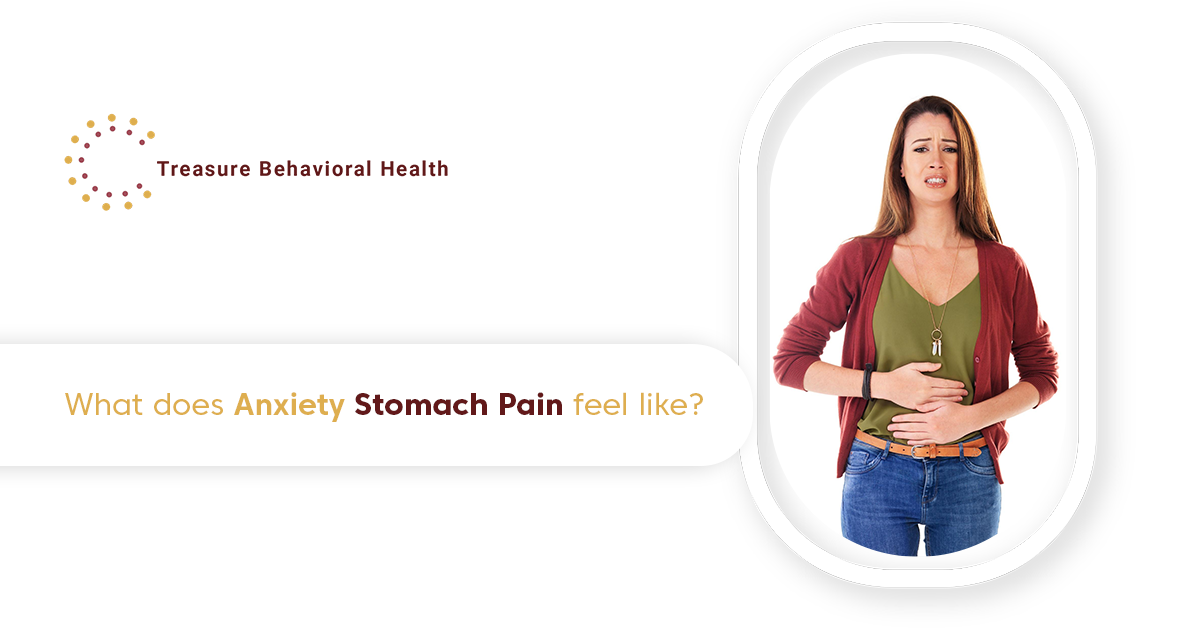Stomach discomfort emerges unexpectedly when stressful situations occur.
Your physical discomfort may cause you to wonder about possible connections with mental health issues.
Could anxiety be causing this, and if so, what does anxiety stomach pain feel like?
It varies but it’s always real.
Let’s break it down clearly. This way, you can understand what’s going on with your body and how to care for it.
The Gut-Brain Connection
Because of its ongoing communication, a relationship exists between your brain and gut via the gut-brain axis.
When your brain experiences stressful situations, it will prompt the gut to generate physical symptoms.
You experience discomfort without any medical evidence to explain it.
So, What Does Anxiety Stomach Pain Feel Like?
Anxiety stomach pain can actually present various sensations to the body.
Symptoms tend to vary.
Symptoms of Anxiety Stomach Pain
Physical Symptoms
- Cramping or sharp abdominal pain
- Burning sensation in the stomach
- Persistent bloating due to anxiety
- Churning or fluttering feeling (like “butterflies”)
- Nausea without a medical cause
- Appetite changes (loss or increased hunger)
- Gas or digestive discomfort
- Tightness or knots in the stomach
Nervous System Responses
- Chills from anxiety
- Sweating or clammy skin
- Lightheadedness paired with stomach pain
- Heart palpitations while experiencing digestive discomfort
Gastrointestinal Effects
- Diarrhea or constipation triggered by stress
- Urgent bowel movements during anxious episodes
- Feeling full quickly or a heavy stomach sensation
- Reflux-like symptoms or anxiety induced indigestion
The combination of symptoms and intensity may differ depending on how stressed someone feels.
Related Reads:
What’s Actually Causing Problems in Your Stomach?
Your body enters an emergency state when anxiety triggers the release of cortisol and adrenaline.
Hormones that emerge from stress activate stomach muscle contractions, yet cause a reduction in gut movements.
A digestive pain could make you wonder whether stress plays any role in these symptoms.
Stomach pain from anxiety tends to be worse than most people anticipate.
Other factors causing problems include:
- Shallow breathing during anxiety.
- Skipping meals or irregular eating patterns.
- Heightened awareness of bodily sensations.
These physical reactions are your body’s way of managing perceived threats, but they often come at a cost.
How to Stop Anxiety Stomach Pain
Understanding how to stop anxiety stomach pain requires the control of both mental and digestive system distress.
Try these evidence-based approaches:
- Deep breathing for a few minutes allows your digestive tract to unwind through relaxation.
- Walking can help. It provides dual benefits by reducing anxiety while supporting good digestion.
- Drinking chamomile or peppermint herbal tea can help as well. Tea helps stomach aches.
- Regularly eating meals at set times helps you maintain stable gut function.
- Stimulant intake should be restricted because both alcohol and caffeine tend to increase GI symptoms.
The combination of CBT along with other therapy approaches proves effective in decreasing anxiety symptoms.
When It’s Time to Reach Out
A consultation with a professional becomes necessary if your gut discomfort continues beyond the normal duration or makes it challenging to perform your daily activities.
Uncontrolled anxiety may create symptoms which resemble digestive disorders or increase the severity of previously recognized gastrointestinal problems.
Your brain and body repetitively signal for assistance through distress signals.
Listening to Your Body
The body frequently communicates its distress before mental awareness catches on to the problem. That dull ache, that bloating, that uneasy stomach?
Stomach problems during times of emotional distress are not accidental events but physiological responses to stress.
Caring for your mental and physical well-being can make a world of difference.
Treasure Behavioral Health Can Help
Our team at Treasure Behavioral Health uses compassionate methods to help clients control their anxiety-related emotional strain alongside physical symptoms.
Dr. Roberta Iyamu gets it—anxiety hurts, inside and out.
Let Treasure Behavioral Health help you heal.
FAQs
Can anxiety cause side pain?
Yes. Anxiety can cause tension and digestive shifts that result in side or abdominal pain.
Anxiety or stomach virus—how can we tell the difference?
Most stomach viral infections combine one or more symptoms such as temperature elevation, vomiting and digestive disturbances.
The pain associated with anxiety occurs because of stress, yet it never involves a fever.
What is anxiety induced indigestion?
The term describes stomach distress that emerges from stress and results in bloating combined with heartburn and cramping.
Why does stress cause stomach pain?
When stress happens, your body releases hormones. These hormones affect your digestive muscles and acid levels. This can cause stomach pain.
Can nerves cause abdominal pain?
Yes. Physical discomfort affects the abdominal area because nervousness causes your muscles to contract.
Can anxiety cause burning sensation in stomach?
The symptom exists frequently, but many people confuse it with acid reflux symptoms.


No comment